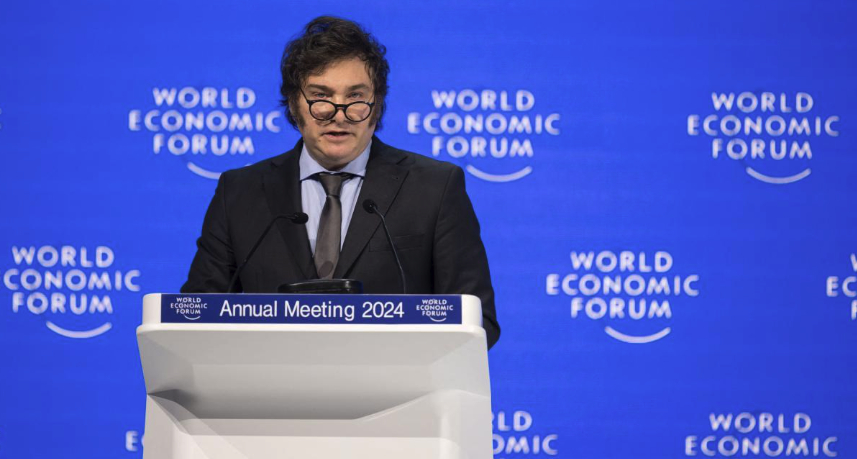Every year, from January 15 to 19, Davos brings together the world’s leading businesspersons and CEOs. The event also brings together political representatives from all over the world, including the Argentine president, Javier Milei. Switzerland, where this exclusive Alpine resort is located, is strongly affected by global warming. With temperatures already exceeding a global average of 2ºC, many of the ski resorts are running out of snow. This phenomenon is certainly not unknown to the organizers, nor is it unnoticed by the participants of the Forum in Davos.
As has been the case in recent years, the latest Global Risk Report issued annually by the World Economic Forum highlights the environmental problem. The climate emergency, as well as the loss of biodiversity, occupies a central role. In the opinion of those interviewed, the future of the world looks bleak, a gloom that recognizes multiple causes (armed conflicts, geopolitical disputes, extreme events, rising temperatures, large population displacements, social unrest, artificial intelligence, and the spread of fake news). This generates concern, both among entrepreneurs and those who occupy public places. Such a situation also forces us to rethink the economy, to revisit the main concepts that underpin decision-making. If investment decisions focus only on efficiency, we will certainly be in trouble.
In a context marked by multiple, often interrelated crises, where radical uncertainty prevails, the idea of resilience takes center stage in the face of extraordinary conditions, and the primacy of efficiency leads to erroneous decisions. Resilience becomes one of the virtues of complex systems, which prioritize the space for learning and adaptation. The presence of uncertainty raises the need to strengthen the system; experimentation and error are admitted. This contrasts with the traditional economic vision, which gives efficiency a prominent place. No less important is today’s prevailing short-term vision, narrow in scope, which prioritizes immediate gain and prevents the search for consensus.
When we look at the environmental proposals of the new Argentine government, we realize how far removed our leaders are from the discussions taking place in the world. The Davos agenda is contaminated with socialism, such is the thinking of Argentina’s top representative of the far right in power. But this claim does not arise in a vacuum, it represents the thinking of the main business entities of the country, claiming to repeal (glaciers, forests) or block the sanctioning of laws (wetlands). The obscurantism of the government is allied with the short-termism of the “red circle”, a new alliance that ignores the critical moment that the society is going through.
Resilience in decision-making
Resilience guarantees the ability to cope with unforeseen events, which arise in any complex society: to weather the risks imposed by the future. Withstanding deep turbulence, surviving shocks, and ensuring the continuity of its most basic functions have been revealed and reaffirmed as fundamental. These shocks generate disturbances, and natural disasters with consequences on human life as well as on the economy. Whatever the disaster, it affects stocks (loss of assets) as well as flows (reduced output). Resilience also implies recognizing the limits of the planet, which explains the need to protect glaciers or preserve native forests.
Investing in resilience imposes costs in the short term, which undermines (short-term) gains. In the medium term, however, the benefits generated by these investments far outweigh the costs. Such is the conclusion drawn in a report by the consulting firm McKinsey for the World Economic Forum in Davos, which reviews both public and private experiences. For some, as for others, considering aspects of resilience implies weighing up the long term when making decisions. Such considerations, however, are often neglected in emerging economies because such inclusion puts pressure on public finances: it implies higher indebtedness.
Resilience and social contract
The great diversity of any society implies that, in the face of a natural disaster, certain groups will be more affected than others. This does not mean that citizens are defenseless in the face of extreme situations such as those described here, at least not necessarily. Societies with social protection systems are better prepared to face a crisis than those without. Any safety net tends to protect the most vulnerable; it is understood as a risk-sharing mechanism. Thus considered, the idea of resilience is not only linked to the concept of robustness and adaptation but also to the capacity for transformation. In a world marked by extreme events, institutional resilience becomes key.
Hence, the importance of consensus and institution building: prevention helps to confront the most diverse risks and reduces uncertainty. If rules are not imposed but are consensual and subject to change, then the system is more likely to be more robust. The aforementioned report highlights the risk of increased polarization and its potential impact on economic decline.
We must look to the future, but no longer with the blinders of the past and the narrow gaze of the present. A resilient system does not return to normal after a shock, but one that can anticipate, absorb, recover, and adapt to a diverse set of systemic threats. When confronted with the uncertainty that the future holds, challenges abound, yet it helps to understand today’s society, in which different interests, values, and visions coexist.
The problem of resilience is associated with topics such as establishing rules that are flexible enough to respond to uncertainty and unexpected changes, but at the same time durable, in the sense of recreating an institutionally credible environment in which people can trust. This raises the importance of the social contract, understood as a mechanism that is recognized by the different sectors of society as a means of coping with the challenges and risks they face. Such a contract will be resilient if it makes it possible to impose limits on the spread of negative externalities by some on others; on the other hand, to insure society against external risks. In this way, social norms emphasize the sense of belonging, they provide a sense of community. Such identity is crucial, and critical to maintaining the cohesion of a society.
Otherwise, if we continue to push the limits of the planet, if the “tipping points” are reached, adaptation may not be enough. From resilience, we move to disaster. And, as we approach the tipping point (also associated with the idea of the “point of no return”), the closer the disaster is perceived, the greater the perception of “every man for himself” that prevails in vast sectors of society.
*Translated by Janaína Ruviaro da Silva from the original in Spanish.












